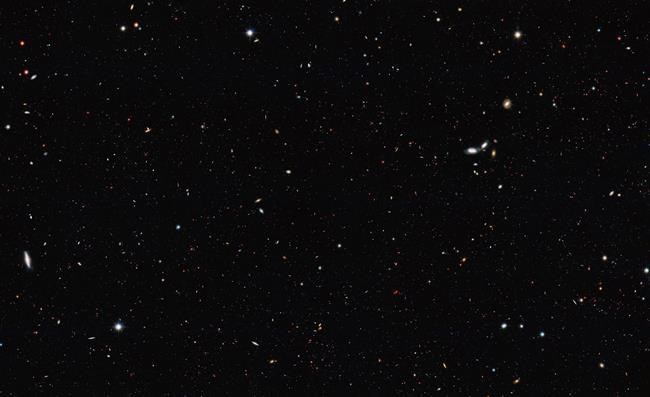
This image made available by NASA, ESA/Hubble on Thursday, Oct. 13, 2016 shows a portion of the southern field of the Great Observatories Origins Deep Survey to recalculate the total number of galaxies in the observable universe. In a report published on Thursday, an international team of astronomers, led by Christopher Conselice, Professor of Astrophysics at the University of Nottingham, have found that the universe contains at least two trillion galaxies, twenty times more than previously thought. (NASA, ESA/Hubble via AP)
Republished October 13, 2016 - 12:29 PM
Original Publication Date October 13, 2016 - 10:40 AM
CAPE CANAVERAL, Fla. - Thought the universe was crowded with 100 billion to 200 billion galaxies? Try 1 trillion or even 2 trillion galaxies and more.
That's the latest census, reported Thursday.
An astrophysics professor at the University of Nottingham in England led the international team that came up with the mind-boggling estimate of 2 trillion galaxies in the universe. Professor Christopher Conselice said that represents a minimum tenfold increase.
In a phone interview, Conselice said he was surprised by the results. He anticipated two or three times more galaxies, perhaps, but "10 is quite high" and it could prove to be even greater.
The scientists based their galaxy head count on deep-space surveys already conducted by the Hubble Space Telescope and ground observatories. They turned the images into 3-D and used new mathematical models for the update.
"It boggles the mind that over 90 per cent of the galaxies in the universe have yet to be studied," Conselice said in a statement. "Who knows what interesting properties we will find when we discover these galaxies with future generations of telescopes?"
Even scientists have trouble wrapping their minds around such huge numbers. According to Conselice, 2 trillion is roughly equivalent to the number of seconds in 1,000 average lifetimes.
The findings are being reported in Astrophysical Journal.
___
Online:
Space Telescope Science Institute: http://www.stsci.edu/portal/
News from © The Associated Press, 2016